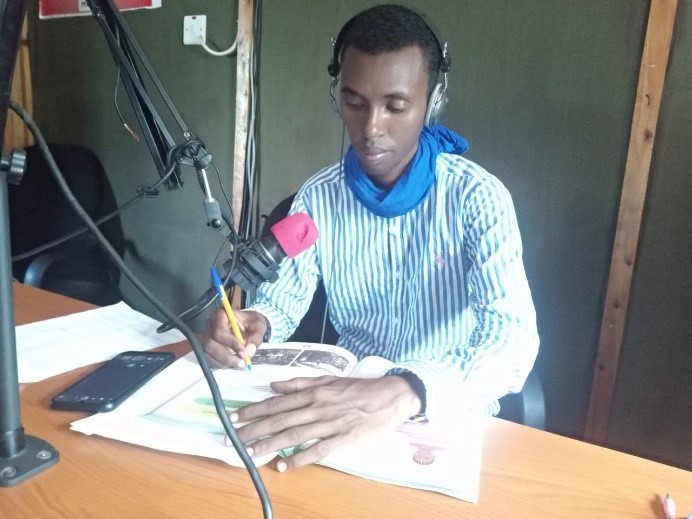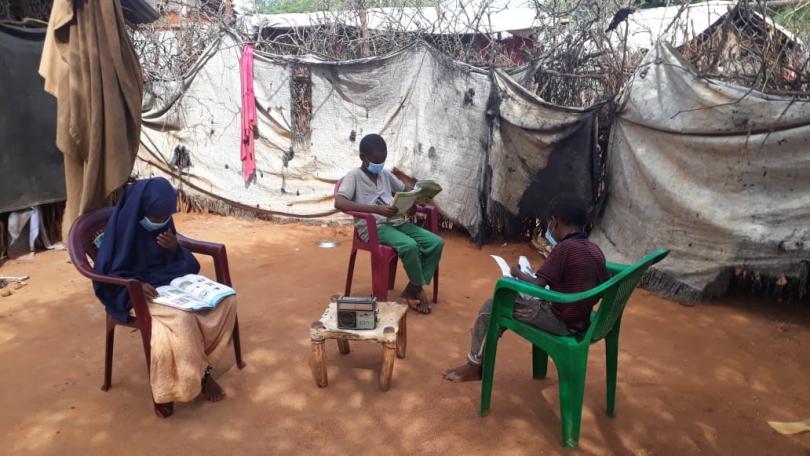PRIORITIZING EDUCATION THROUGH RADIO PROGRAMS IN DAADAB REFUGEE CAMP

By Florence Dzame
In Daadab Refugee Camp in Northern Kenya, young learners tune into Gargar radio to participate in education sessions supported by Save the Children. Children in Kenya and across the region are facing the greatest disruption to their education in living memory due to closure of schools as a measure to prevent the further spread of COVID-19. Since the directive was issued by the Ministry of Education for schools to close by 20th of March 2020, an estimated 16,528,313 learners in Kenya are out of school according to the National Education Sector Plan (2019-2023, from Early Childhood Development Education to Secondary school learners. The situation in the camp is even direr because 50% of the camp’s population are children and more than 40,000 school-age children were already out of school according to UNHCR and Education Management of Information System data.
“Young learners especially those in the refugee camp are more affected since they cannot access digital learning tools. Also affected are learners with special needs and impairments who cannot follow through radio lessons,” said Tukow Nuuh Program Manager Save the Children
Save the Children, other implementing partners and other UNCHR departments came together to ensure learners in the camp enrolled in non-formal education continue to access education during the pandemic. The radio sessions air different subjects (including mathematics, english, environment, religious, education and creative art) twice a week for one hour using the non-formal curriculum. The programs are live and the teachers go to the radio stations to deliver the lessons.

Radio Presenter in Daadab Refugee Camp during the education programs
Reports show that about 60% of the learners have radios and are able to tune in.
The programs also create awareness on COVID-19 prevention measures and reporting channels of suspected cases to the authorities.

Save the Children calls for the Ministry of Education to urgently ensure that systems for inclusive remote learning are in place, recognizing school closures will hit the most marginalized children hardest. Particular priority should be given to children who cannot access digital learning tools. These are children from low-income households, rural and marginalized areas, those with disabilities and children from the refugee camps.
“It will cost more if we don’t act now. We know from other public health crises, that once older children lose access to education, they are less likely to return. This is also the case for the most vulnerable children, who end up in child labour, child marriage and facing other life threatening protection risks. For younger children, even a few months of missed education can have long-term effects on their lifelong learning, requiring additional and intensive remedial efforts to catch up,” said Wang Le, Country Director Save the Children Country Kenya and Madagascar
Since the start of the outbreak, Save the Children continues to respond to the needs of communities in countries impacted by the COVID-19 outbreak. We are supporting distance learning by sensitizing families on the available radio lessons being offered by the Kenya Institute of Curriculum Development for formal learners and supporting recording of lessons for non-formal learners and working towards providing radios where necessary for continued learning, particularly in Daadab refugee camp in non-formal schools, Nairobi informal settlements and Arid and Semi-Arid counties in Northern Kenya. We are also providing remote counselling and psychosocial support for children and sensitizing communities via mass media on the increased risks for children and how to protect themselves during this pandemic. We will be leading back to school campaigns when the worst is over to make sure that the most vulnerable children return to, and stay in school.




